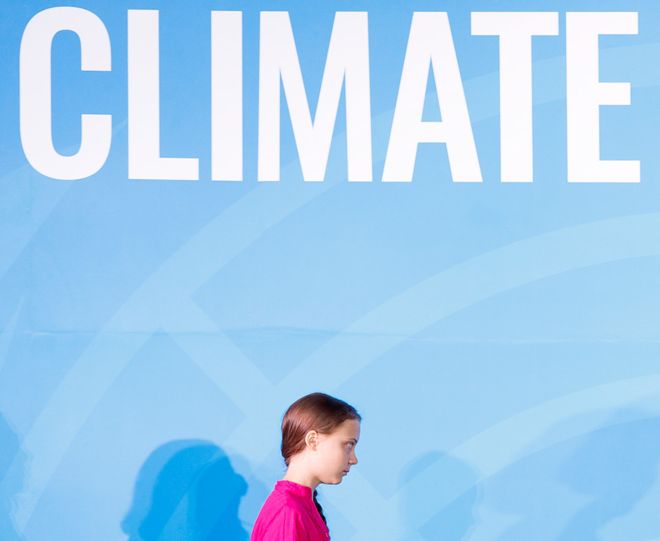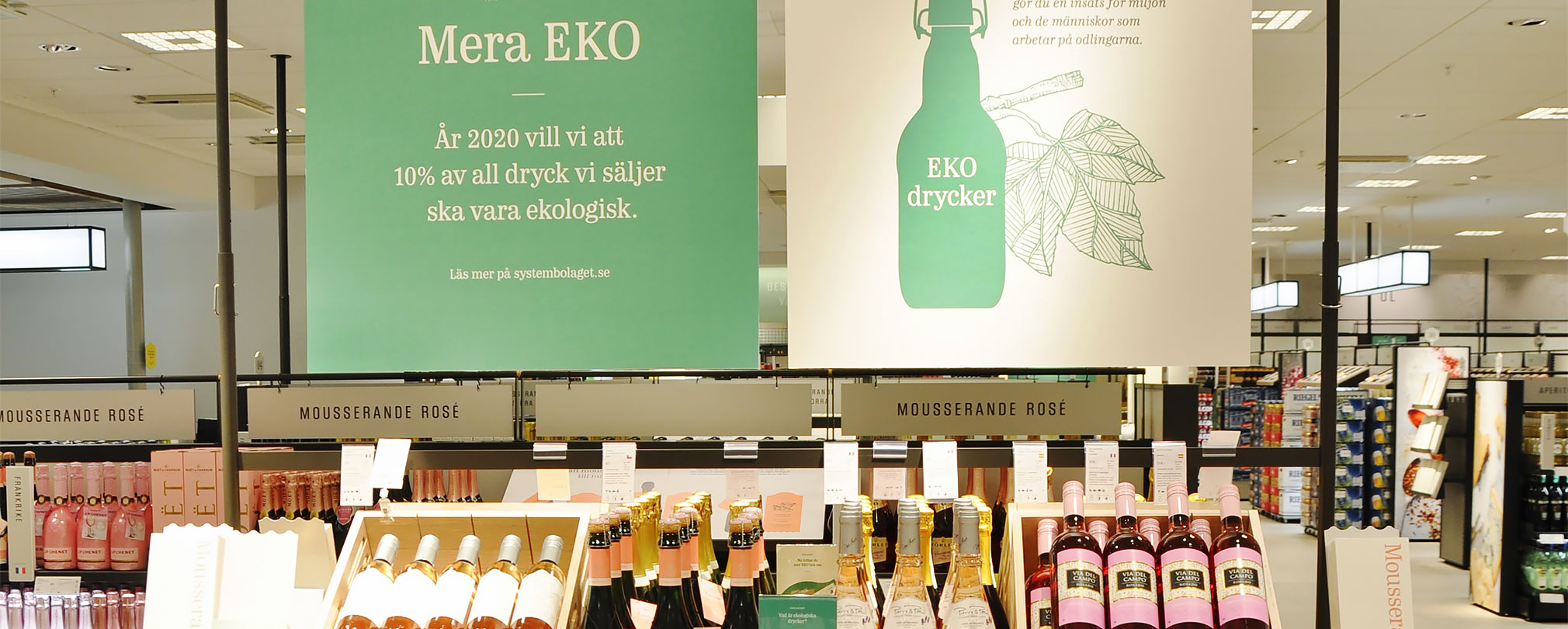In Sweden the government is responsible for selling all alcohol, through a chain of stores called “Systembolaget”.
Recently signs have popped up in these stores urging people to buy organic products, for the sake of the environment. A lovely sentiment to be sure, but are their good intentions based on reality?
This was interesting to me for two reasons. First of all, did they have any evidence for this claim? Do they actually make sure that the specific organic products they sell are actually better for the environment?
“Alcohol is not like other products. That why we sell responsibly and don’t try to tempt you to buy more than you planned to. We have no sales-campaigns or special prices.”
Secondly because Systembolaget prides itself on having no advertising whatsoever, to reduce the harm caused by alcohol. [Source] Organic products are generally recognized as a marketing ploy, so selling them is one thing, promoting them specifically is a whole other thing. Especially considering that organic products are almost always more expensive.
So I made an inquiry to see if they could back up their claims.
I actually got two responses, one from customer service and from the press department.
Following are the responses translated to English:
Answer 1: Organic products are better for animals and nature near the crops, and those working on the farms get a better working environment with less poisons. The explanation lies mainly in how the raw material is grown. Beer, wine and spirits start as grains, grapes or potatoes. If the raw material is grown organically, the rules are stricter when it comes to manure and pesticides. On the Swedish Society for Nature Conservation and KRAV website you can find links to various scientific reports that substantiate this statement.
Answer 2: Because organic certifications do not allow chemical pesticides or fertilizers, it’s good for both the environment and especially for those who work with it. Here you can read more about how organic agriculture contributes..
If you wish to read the original Swedish reply you can find it here.
The site is the one of the Swedish KRAV certification. And certainly KRAV certified products can prove that they are better for the environment. Here’s information on their screening process.
Unfortunately this is not at all the same thing as ‘Organic’. Even the KRAV website says so. And not even a majority of organic products sold at Systembolaget are KRAV certified.
But the European Union also has an organic certification, what about that?

Let’s first note that this only applies to products produced for Europe. Organic means very different things depending on where in the world you are. In the US for example the USDA decides what products can call themselves organic. The requirements are quite different.
KRAV outlines the main differences between their certification and the European organic certification on their website.
The requirements for EU organic certification can be found here and outlined here. They are not particularly impressive. Most of the criteria are not proven to have any beneficial effects on nature or health.
Artificial manure cannot be used. Potentially this reduces the amount of fertilizer that gets into the groundwater. But results are uncertain and some studies show it makes no difference.
GMOs (Genetically Modified Organisms) are 100% banned from being organically certified. No studies have ever shown environmental or health benefits from this [Source]. In fact many GMOs are developed to solve environmental and health related issues. Such as increased crop yield [1], products that last longer [2], and increased amounts of vitamin A [3].
Ionizing irradiation is banned. Now that’s all good and well if it were people being radiated. But even ionizing radiation is unlikely to affect health benefits of produce. [WHO]
No chemicals?
In the response I got they also claim that their organic products are better because pesticides and chemicals are not used in the farming process. This is entirely untrue.
On their website you can find information on what they consider organic. Unfortunately this information is rather misleading. Even so, there they themselves acknowledge that pesticides and fertilizer are used on organic crops.
The second response also refers to non-chemical pesticides, which is somewhat ironic since everything is made of chemicals. What it actually refers to are chemicals that aren’t artificially produced. But what difference does it make where it comes from? The properties of the chemicals are of more interest when it comes to safety. Fact of the matter is that organic crops are allowed to use a bunch of different pesticides, some of them are even carcinogenic. [Source]
Although one has to see the irony of complaining about trace amounts of carcinogenic chemicals found in a substance (ethanol) that has been proven to have a significant carcinogenic effect.
In the other reply they make the case that the pesticide use is limited and all of the fertilizer is organic, as in chemically organic (carbon based). The first statement is far too generalizing, often it is actually the case that more pesticides are used. [Source] As for fertilizer I’d love to see the kind that is not carbon based. By the way, gasoline is carbon based, so that’s not much of an argument on its own.
It’s also interesting to note that in Europe conventional crops also have limitations on how much residue from pesticides are allowed on produce that is sold. [Source]
In the response they also claim that organic produce is better for the environment itself, and therefore their products are too. The problem is, in almost every case organic produce requires more resources and space to grow than conventional produce. Which is quite the opposite of what they claim.

So what?
What we have here is simply a case of false advertising, and at the cost of the environment none the less. But the worst part in my opinion is that this is not the result of insidious marketing efforts, but rather ignorance.
And it’s especially bad when the government makes such a mistake. Through this whole campaign to sell more organic nobody ever thought to actually confirm if what they are claiming is correct and applies to all organic products.
However, in the defense of organic products, at least in Sweden. Things are getting better and organic products are getting closer to being what they originally promised to be. The Swedish department of agriculture (Jordbruksverket) have made an in depth analysis of where organic is now, where it’s going, and what has to change. You can find this here.
Still with organic products being so diverse it’s impossible in todays market to make the claim that all organic products are better or healthier.
“When you choose organic or ethical products you make an effort to help the environment and the people who work on the farms.”
Systembolaget also urges it’s customers to buy things that are certified ethically produced. That is that the workers who make the product are fairly and ethically treated. Seeing as there are a bunch of holes in their reasoning behind organic products one can only hope that the same doesn’t go for ethically certified products. After all, there are about as many ethical certifications as there are environmental ones. Some more and some less serious and stringent.
What should Systembolaget do instead if they wish to help the environment?
What we would love to see is for Systembolaget to be able to back up their claims. Because indeed it would be a good thing if they encouraged people to buy more environmentally friendly products.
One way they could accomplish this is to have their own certification and screening process. Of course that may be too expensive to be practical.
But a far simpler measure they could take is to stop assuming that all organic products are the same. If they instead promoted specifically KRAV certified products that would accomplish what they were originally trying to do.
Other certifications might also do the trick, but the point is that there are big differences between these certifications requirements. And to claim that all organic products are better for the environment or for your health is simply not true.
Clearly they have all intentions of doing good, so hopefully they will listen to this criticism and change their ways.
Further reading:
This article discusses why specifically organic wine can be worse for the environment.
One thing Systembolaget is indeed doing right is to urge manufacturers to use less glass in bottles. [Source]









